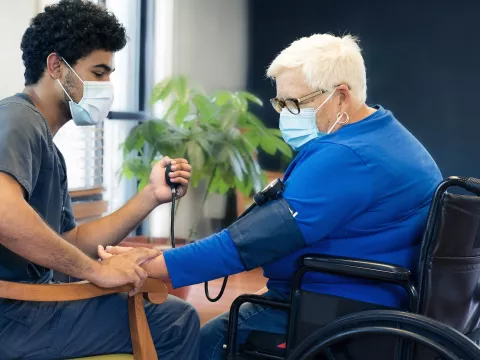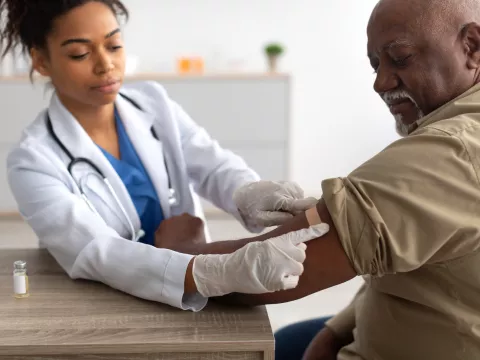- AdventHealth

Millions of Americans experience high blood pressure (hypertension) every year — and surprisingly, many don’t even know they have the condition. Because high blood pressure raises your risk of heart attack or stroke, not knowing your blood pressure is elevated can put your life at risk.
If you don’t know your blood pressure numbers, talk with your AdventHealth Well 65+ provider about your blood pressure at your next appointment. A better understanding of your numbers and high blood pressure risk can help you chart a plan for healthy living and reduce your risk of heart disease.
What Is High Blood Pressure?
High blood pressure becomes more common as you age, and many older adults experience the condition. That’s why it’s important to monitor your blood pressure and understand your readings.
Simply put, your blood pressure is the measure of how much force your blood puts on the walls of your arteries. Years of too much force can make your arteries weak and strain your heart, putting you at risk of heart disease.
A normal, healthy blood pressure reading is 120/80 mm Hg. If your blood pressure is elevated above those measurements, you have high blood pressure.
If your blood pressure measurements read 140/90 mm Hg or above, you have severe hypertension.
What Are the Symptoms of High Blood Pressure?
There’s a reason high blood pressure is called “the silent killer.” Even when you have dangerously high blood pressure, you may not have any symptoms. However, discuss any of these symptoms with your primary care physician:
- Headaches
- Nosebleeds
- Shortness of breath
It’s important to keep in mind that these can be symptoms of a lot of other conditions, from dry winter air to exercise. If these symptoms do appear and are caused by your blood pressure, it may already be at life-threatening levels.
This is one of the reasons why it's so important to have regular checkups with your doctor, discuss any symptoms you're experiencing and to monitor your blood pressure.
When Should I Get My Blood Pressure Checked?
The best way to ensure your heart is healthy is to get your blood pressure checked regularly. These checkpoints are so important, and it’s common practice for your doctor to check your blood pressure at every appointment, regardless of the reason you’re being evaluated.
If you’re at risk of high blood pressure, you should get checked more frequently. You may be at risk if:
- You are obese
- You don’t exercise
- You drink alcohol heavily
- You have a family history of high blood pressure
- You smoke or chew tobacco
- You have diabetes or kidney disease
If you’re concerned about your high blood pressure risk, speak to your primary care provider to get personalized recommendations.
Can I Improve My Blood Pressure?
The good news is that you can help your body maintain a normal blood pressure by adopting a healthy lifestyle. To maintain a healthy blood pressure range, aim to:
- Avoid heavy alcohol use
- Eat less salt
- Eat a healthy diet
- Exercise moderately for 150 minutes per week
- Maintain a healthy weight
- Stop using tobacco
Your AdventHealth Well 65+ provider can also prescribe medicines that help lower your blood pressure.
Here to Help Keep You Well After Age 65
At AdventHealth Well 65+, we’ll partner with you to help you understand and manage health conditions like high blood pressure, so you can stay well for years to come.



